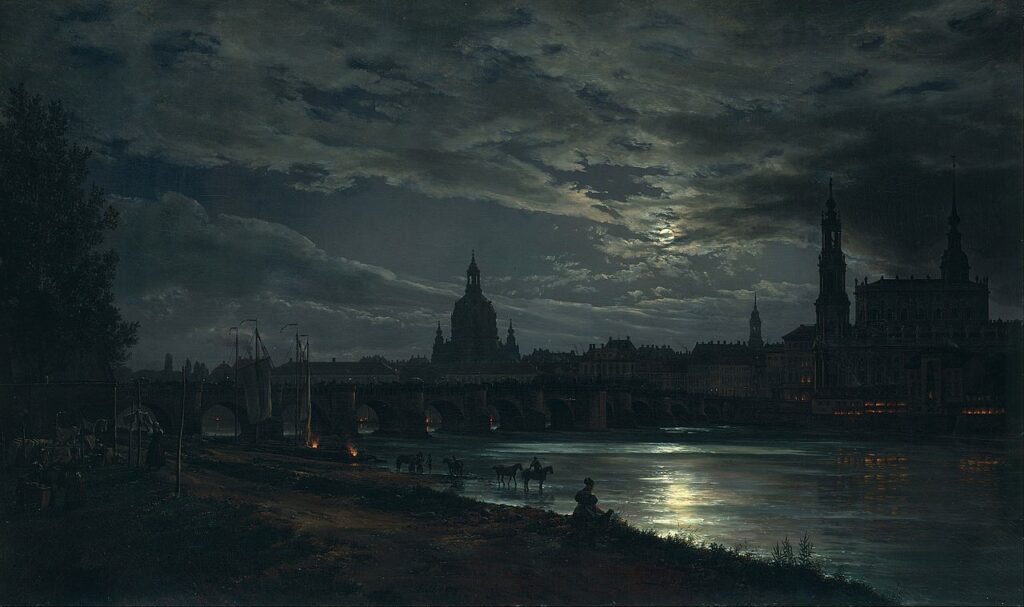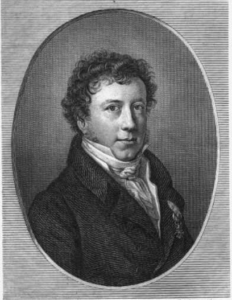Night and dreams
(Poet's title: Nacht und Träume)
Set by Schubert:
D 827
[1822 or early 1823]
Heil’ge Nacht, du sinkest nieder!
Nieder wallen auch die Träume,
Wie dein Mondlicht durch die Räume,
Durch der Menschen stille Brust.
Die belauschen sie mit Lust,
Rufen, wenn der Tag erwacht:
Kehre wieder heil’ge Nacht,
Holde Träume, kehret wieder.
Holy night, you are sinking down;
Dreams too are floating down,
Like your moonlight through the expanses of space,
Through the silent breasts of human beings,
Who eavesdrop on them with pleasure;
They call, when day awakes:
Come back, holy night,
Beauteous dreams, come back again.
All translations into English that appear on this website, unless otherwise stated, are by Malcolm Wren. You are free to use them on condition that you acknowledge Malcolm Wren as the translator and schubertsong.uk as the source. Unless otherwise stated, the comments and essays that appear after the texts and translations are by Malcolm Wren and are © Copyright.
☙
Themes and images in this text:
Chest / breast Dreams Morning and morning songs Night and the moon Noise and silence Space
One of Collin’s titles for this poem was ‘Nachtfeier’ / ‘Ceremony of Night’ or ‘Night Celebration’ (see notes on the text below). In the previous generation the idea of holding a solemn celebration of darkness rather than light would have appeared perverse. In the so-called age of Enlightenment most European intellectuals wanted to bring clarity to a world that they saw as befogged by superstition and arbitrary authority. Poems about night (there were many such, often set in graveyards) tended to signal the hope of a new day dawning, offering a new start or a new life (for those who have entered the night of death). Although there were strands of ‘enlightenment’ thought that were critical of religion (equating it with superstition and obfuscation), the central metaphor of ‘light’ and ‘darkness’ was inherited from Christianity:
Lighten our darkness, we beseech thee, O Lord; and by thy great mercy defend us from all perils and dangers of this night; for the love of thy only Son, our saviour, Jesus Christ. Amen The Collect for Aid against all Perils in 'An Order for Evensong', probably written by Thomas Cranmer, The Book of Common Prayer 1549
By the 1820s the mood (amongst both writers and readers) had changed. Novalis published his ‘Hymns to Night’ (Hymnen an die Nacht) in 1800, and in the years following it became almost conventional for poets to hail night as the domain of perfection and truth, somewhere we could escape to after all the confusion and delusion of ordinary ‘daily’ living. In the following years the ‘romantic movement’ encouraged this veneration of night since it seemed to offer so much more profundity than what was presented as the superficial coldness and objectivity of ‘the age of reason’.
Above all, night came to be seen as offering a chance to dream. If the Enlightenment had valued ‘daydreams’ – projects of practical improvement – Romanticism encouraged the view that nocturnal dreams might allow us to perceive a level of reality or significance that previous generations had ignored or lacked the sensitivity to take seriously. Collin therefore writes about dreams descending along with night itself. Like moonlight they permeate the expanses of dark space and enter the silent breasts of humans, where sensitive souls eavesdrop and attempt to learn from them. Dreams are therefore presented as something external and objective, they are a necessary corrective to our day-to-day experience of the world. Later writers (Freud most notably, but also other traditions in psychology) would read dreams as internal, subjective phenomena: they well up from the depths of a soul that is far from quiet or calm and they usually reveal a world of torment rather than solace.
For Collin and his readers, it is waking up that brings about disturbance and psychic discomfort. This is a common enough experience as we emerge from a dream into awareness that what had seemed so real and valuable was not what it had seemed. The conventional view of this moment of realisation was to treat it as a way of understanding human perception in general: we have a tendency to be deluded, in particular by our inner turmoil and inclinations, so we should use all the powers at our disposal to ‘wake up’ and accept things as they are, not as we would like them to be. Nacht und Träume encourages us to indulge in the opposing inclination, though. As day dawns and we awake with the light, we come to value the world of night all the more. We beg it to return as soon as possible so that we can re-enter the world of dreams. It is this longing to return that structures the poem’s rhyme scheme (abbccdda). We need that reality to come down (nieder) again (wieder).
☙
Original Spelling and Notes on the text Nacht und Träume Heil'ge Nacht, du sinkest nieder; Nieder wallen auch die Träume, Wie dein Mondlicht durch die Räume, Durch der Menschen stille Brust; Die belauschen sie mit Lust, Rufen, wenn der Tag erwacht: Kehre wieder heil'ge1 Nacht, Holde Träume,2 kehret wieder. 1 Schubert appears to have changed 'heil'ge' (holy) to 'holde' (beauteous), probably by mistake under the influence of the following line. 2 In Schubert´s manuscript of the song this comma is omitted, which would change the meaning (from an invocation to a description - beauteous dreams are returning). As Peter Rastl points out, we cannot know if he simply omitted the comma because he was writing quickly or if he intended to change the meaning.
Schubert must have made his setting of these lines from Collin’s manuscript, since the text was not published until after the poet’s death in 1824. In his posthumous collected works (Matthäus Edler von Collin´s nachgelassene Gedichte, ausgewählt und mit einem biographischen Vorwort begleitet von Joseph von Hammer, Wien 1827) the poem which Schubert called Nacht und Träume appears in three slightly different versions:
Volume 1, page 134
Nacht und Träume
Nacht! verschwiegne, sankst du nieder?
Nieder durch die dunklen Räume
Wallen heimlich jetzt die Träume
In der Menschen stille Brust,
Die belauschen sie mit Lust;
Rufen, wenn der Tag erwacht:
Kehre wieder heil’ge Nacht!
Holde Träume, kehret wieder.
Night and dreams
Night! in your discretion, have you sunk down?
Down through these dark expanses of space
Dreams are now floating secretly
Into the silent breasts of human beings,
Who eavesdrop on them with pleasure;
They call, when day awakes:
Come back, holy night,
Beauteous dreams, come back again.
Volume 2, page 149
Nachtfeyer
Heil’ge Nacht, du sinkest nieder;
Nieder wallen auch die Träume,
Wie dein Licht durch diese Bäume,
Lieblich durch der Menschen Brust;
Die belauschen sie mit Lust,
Rufen, wenn der Tag erwacht:
Kehre wieder heil’ge Nacht,
Holde Träume kehret wieder.
Ceremony of night
Holy night, you are sinking down;
Dreams too are floating down,
Like your moonlight through these trees,
Lovingly through the breasts of human beings,
Who eavesdrop on them with pleasure;
They call, when day awakes:
Come back, holy night,
Beauteous dreams, come back again.
Volume 2, page 65
In the play ‘Fortunats Abfahrt von Cypern‘ at the beginning of a scene set on board a ship, the Count of Flanders is given these lines:
Der Graf
Nacht! verschwiegne, sankst du nieder?
Nieder wallen auch die Träume,
Wie dein Licht durch diese Räume,
Durch der Menschen stille Brust.
Die belauschen sie mit Lust;
Rufen, wenn der Tag erwacht;
Kehre wieder, heil’ge Nacht!
Holde Träume, kehret wieder.
The Count
Night! in your discretion, have you sunk down?
Dreams too are floating down,
Like your light through these expanses of space,
Through the silent breasts of human beings,
Who eavesdrop on them with pleasure;
They call, when day awakes:
Come back, holy night,
Beauteous dreams, come back again.
Confirmed by Peter Rastl with Matthäus Edlen von Collin’s nachgelassene Gedichte, ausgewählt und mit einem biographischen Vorworte begleitet von Joseph von Hammer. Zweytes Bändchen. Wien. Gedruckt und im Verlage bey Carl Gerold. 1827, page 149.



